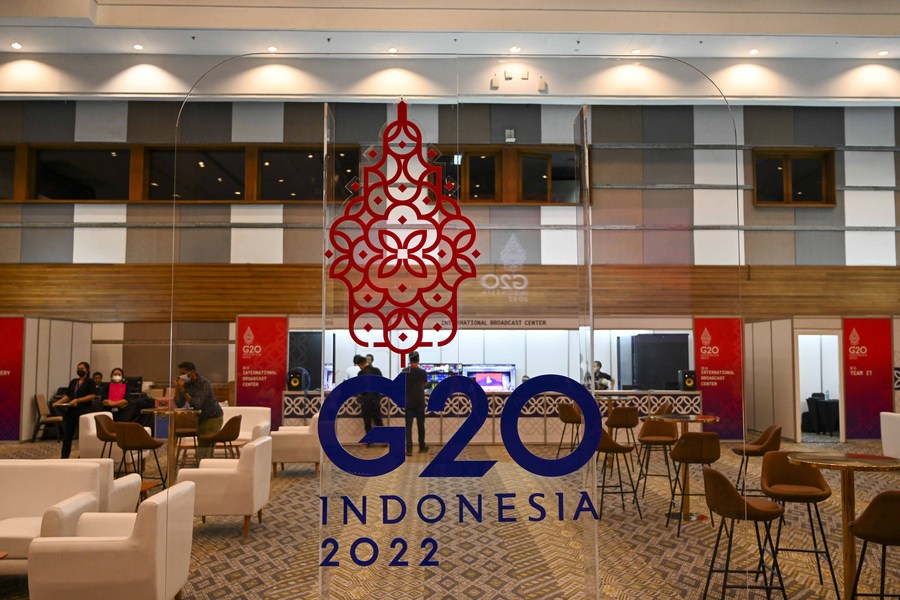
This photo taken on Nov 12, 2022 shows an interior view of the media center for the 17th Group of 20 (G20) Summit in Bali, Indonesia. [Photo/Xinhua]
During the just-concluded G20 Summit and APEC Economic Leaders' Meeting, the Global Development Initiative previously proposed by Chinese President Xi Jinping offered a beacon of light to a world darkened by the COVID-19 pandemic, regional conflicts and geopolitical tensions.
Warmly welcomed, particularly by developing countries, the Global Development Initiative was first proposed by President Xi at the General Debate of the 76th Session of the United Nations General Assembly on Sept 21 last year. It calls on the world to stay committed to development as a priority and for countries to adopt a people-centered approach that is innovation-driven and results-oriented and seeks harmony between man and nature.
Aimed at building a global community of development, the Global Development Initiative seeks to expedite the implementation of the UN's 2030 Agenda for Sustainable Development. It affirms the UN system at the center of global governance and seeks collaboration with related international mechanisms.
UN Secretary-General Antonio Guterres has praised the Global Development Initiative as being of great importance to advancing the UN Sustainable Development Goals. He also stated in his meeting with Chinese State Councilor and Foreign Minister Wang Yi in September in New York that the two sides have been carrying out close and effective cooperation, and that the UN supports the initiative.
It is worth noting that China has recently called for a working mechanism to be set up at the UN level as soon as possible to advance the initiative and for related specialized UN agencies to synergize with the initiative's priority areas based on their portfolios.
China has always been a member of the big family of developing countries and has been making tremendous efforts to promote common development. The Global Development Initiative is a significant public good offered by China in this regard.
When China hosted the G20 summit in 2016, development was made a priority on the global macro policy agenda. Since then, Chinese leaders have repeatedly emphasized development in their speeches on many occasions.
During the G20 Summit in Bali, President Xi identified food and energy security as the most pressing challenges facing global development, and highlighted global trade, the digital economy, the green transition and fighting corruption as key factors driving global development. During the recent APEC Leaders' Meeting, he said it is "imperative" that development is placed at the center of the international agenda.
China is working hard to implement the Global Development Initiative, with many concrete measures announced. For example, it has upgraded the South-South Cooperation Assistance Fund to a Global Development and South-South Cooperation Fund and added $1 billion to the fund on top of the $3 billion already committed. So far this year, China has provided multiple batches of emergency food assistance to other developing countries in need, and recently pledged to provide additional emergency humanitarian assistance.
All these measures are expected to help developing countries tap their growth potential and bring new opportunities to them.
China has always believed that true development is development for all, and all countries should collaborate in, contribute to and benefit from global development.
Since the Global Development Initiative was proposed, it has been a public product that is open to the world. On separate occasions, China has expressed the hope that all countries will join the initiative. In less than one year, more than 60 countries have joined the Group of Friends of the Global Development Initiative.
China is also proactively aligning the initiative with the development strategies of relevant countries and regions. So far, the initiative has been aligned with the Pacific Roadmap for Sustainable Development and the 2050 Strategy for the Blue Pacific Continent by Pacific Island countries. African countries have also synergized the GDI with the African Union's Agenda 2063. Furthermore, the initiative is compatible with the ASEAN Community Vision 2025, according to Ong Tee Keat, chairman of the Center for New Inclusive Asia, Malaysia.
As mentioned by Chinese leaders on many occasions, China is willing to work with all parties to actively implement the Global Development Initiative to ensure that no country or individual is left behind.
With the entire world facing pronounced development problems, it is very timely for China to propose the Global Development Initiative and direct world attention to the pressing problems faced by the vast majority of people in developing countries. It is true that the initiative is in the process of being refined, having just been proposed. As State Councilor Wang Yi pointed out while speaking at the Ministerial Meeting of the Group of Friends of the Global Development Initiative in June this year, having sketched the outline, the fine details now need to be added.
(This article was first published in China Daily on December 3)
